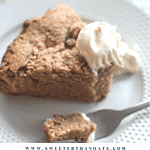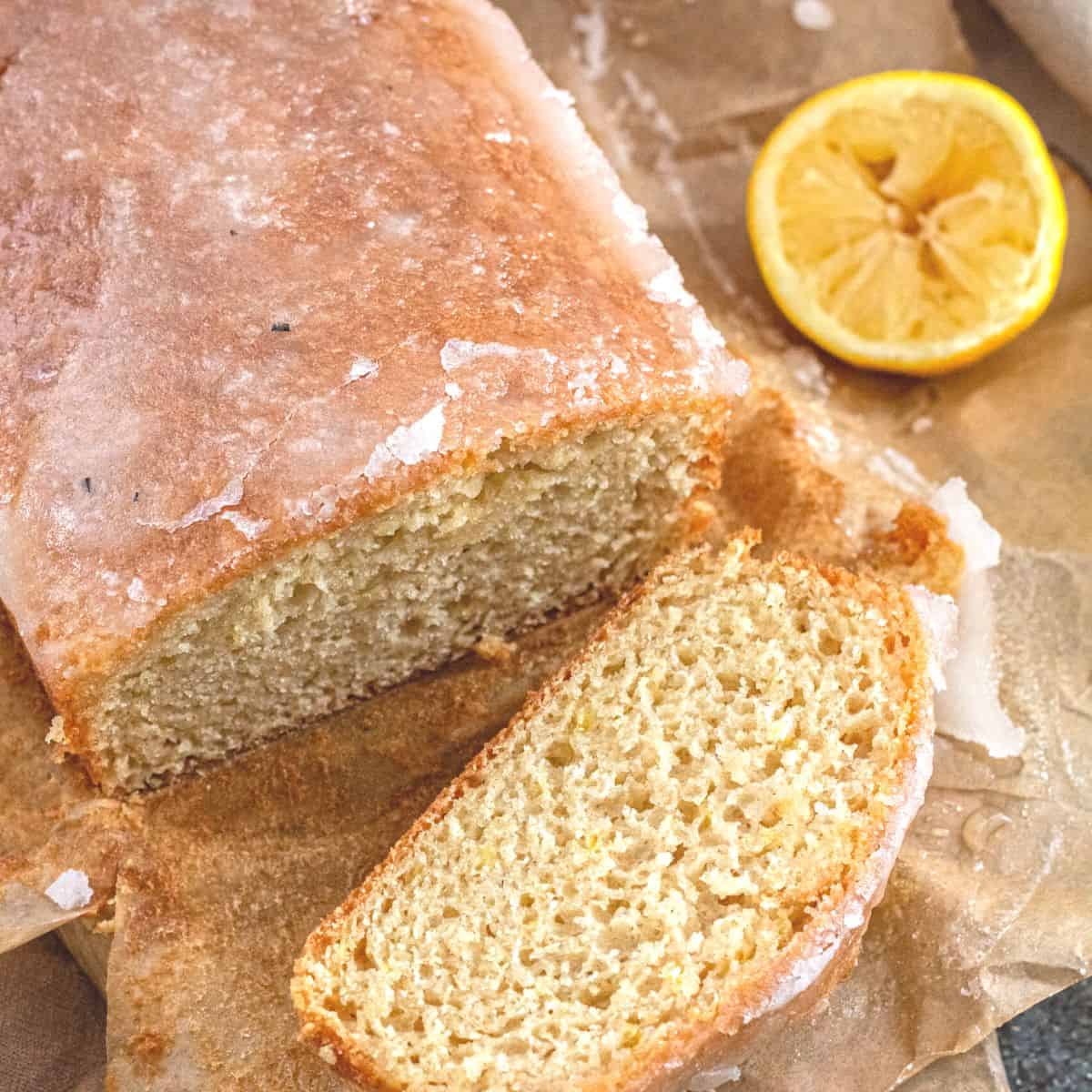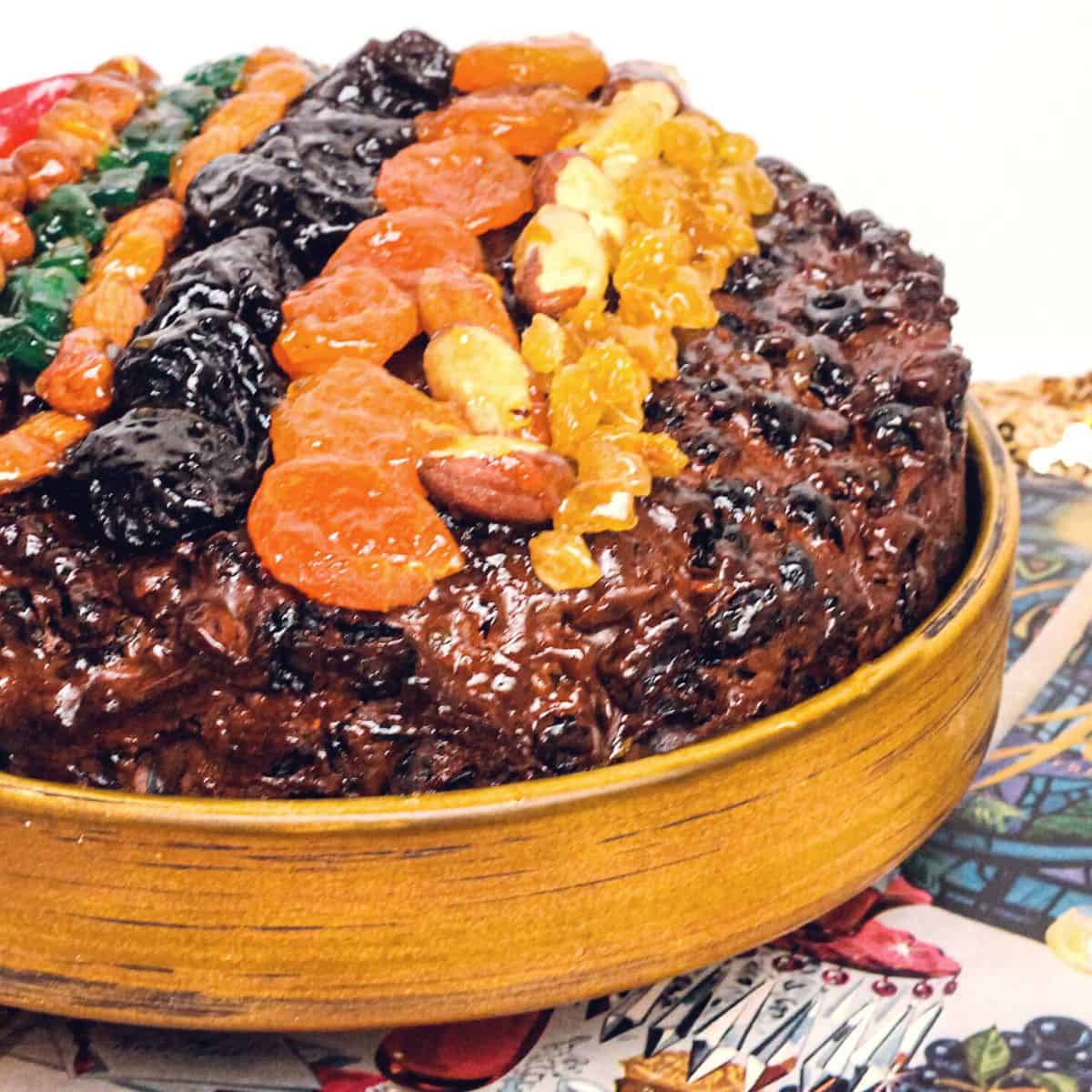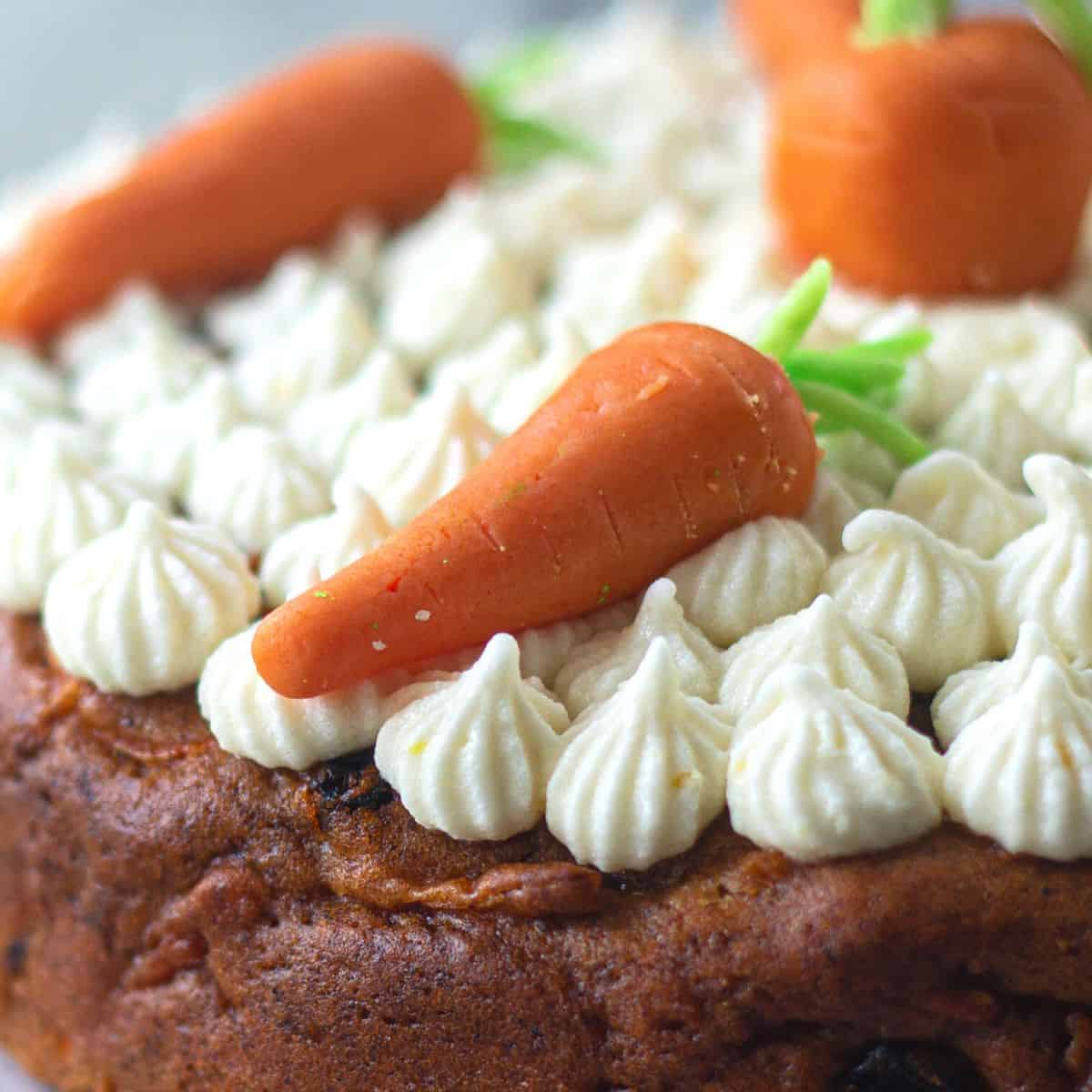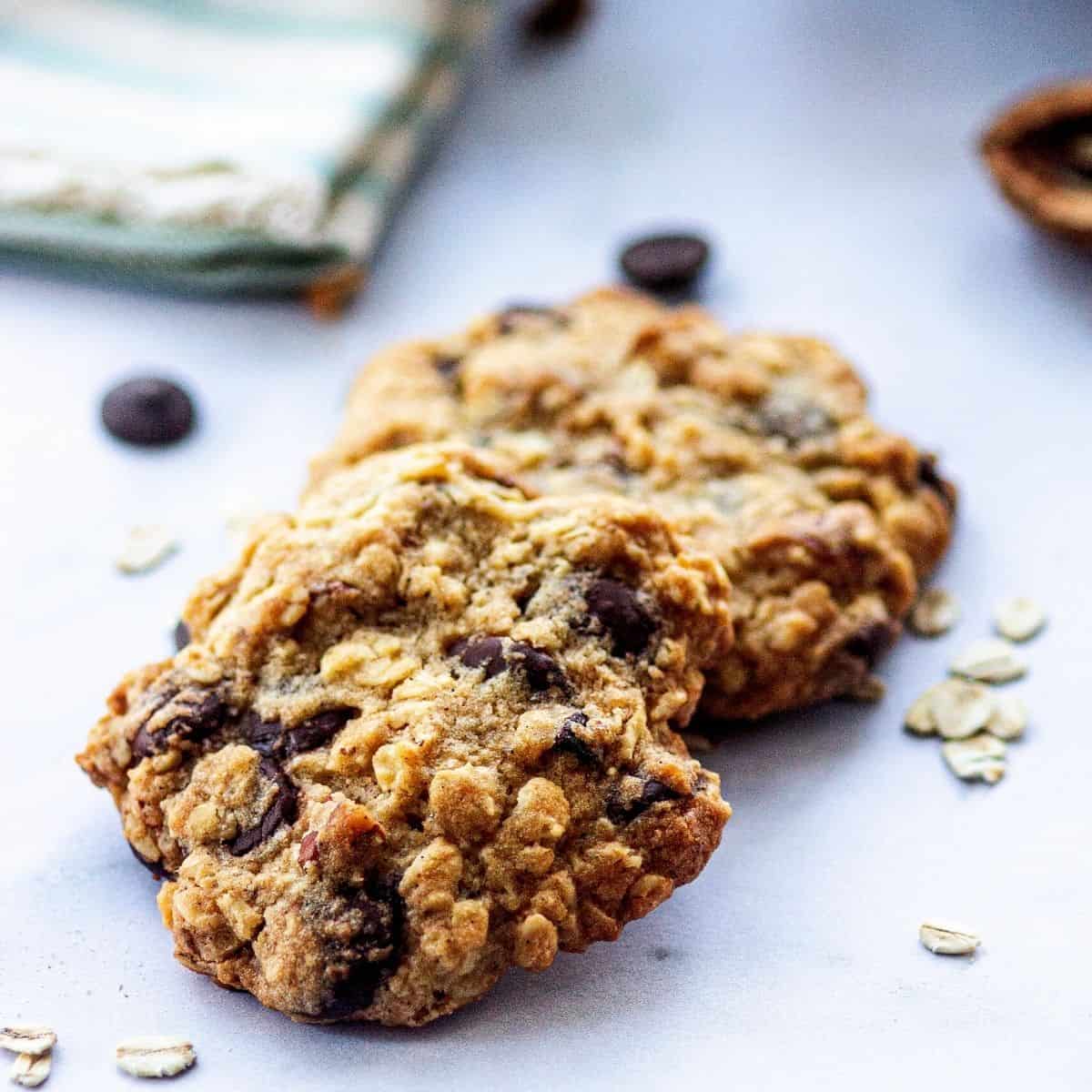Vegan Olive Oil Quince Cake
My vegan quince cake is a delicious, dairy-free option for those following a plant-based diet. Quinces are a unique fruit known for their fragrant aroma and sweet, tart flavor. This recipe combines the natural sweetness of quinces with wholesome ingredients to create a moist and flavorful cake, using olive oil and ground almonds to give a delightful texture.

My vegan quince cake was my first fully hatched recipe. By which I mean, an original recipe (Torta Di Mele by Anna Del Conte) that I have taken and reshaped. I haven’t actually tried the original but when the quince season has passed fragrantly by, I will experiment using apple.
This is an unusual cake in that it uses olive oil for its fat content, instead of the usual butter or (gasp!) margarine. Not only does this save on arm power when beating the sugar and fat together, but it makes the texture of the cake very light and moist, with a tender crumb. You don’t taste the olive oil in the cake, but it seems to add a unique element to this unusual cake.
Table of Contents
Some interesting facts about the Quince
Apples and pears are related to the quince, though it is more likely that they have evolved from the quince. The texture of a poached quince, with its slightly grainy feel on the teeth, is similar to that of a pear.
It was the quince that was originally used into what developed into modern day marmalade: marmalada, derived from the Greek word for preserved quince, melimelon. It has an outstandingly high pectin content, hence the production of membrillo, or quince cheese, which is a firm, almost chewy preserve, cooked for a couple of hours, then laid out in the warm sun to dry out. It is then cut into squares and served with savouries or as a sweet pastille, tossed in sugar.
Several quinces can go quite a long way. I recently prepared membrillo using two fruits that had started to go brown and I needed just one to add a haunting whisper to this cake, and their unique citrus-apple flavour is beguiling.
There are so few quince trees left in England that actually fruit and are not just ornamental, that to be given some from a windfall is a real gift. They were first noted in English records dating back to the 13th Century when they would have been brought over from Spain. Due to the cold weather in Britain, they only fruit when the weather here is particularly tropical.
I have written at length about the beautiful quince here, along with my quince and cardamom loaf cake recipe.
Ingredients
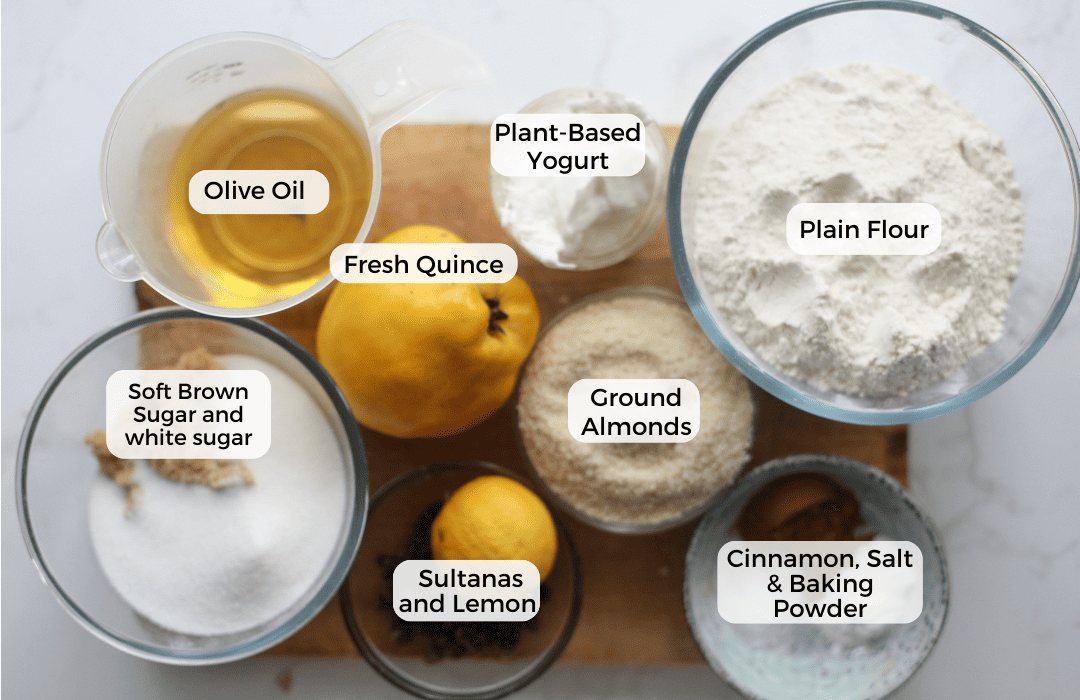
- quince
- olive oil, I don’t use an extra virgin olive oil, just a normal cooking olive oil.
- natural vegan yogurt. This replaces the egg element.
- ground almonds and plain flour
- sugar, brown and white
- sultanas and lemon zest
This is ONLY a list of ingredients for the recipe; please see recipe card below for complete printable recipe.
Instructions
To prep the quince

Top and tail the quince, then cut off slices until you reach the woody core. Discard the core.

Add the sliced quince, sultanas and a teaspoon of sugar to a pan and cover with water. Bring to a gentle simmer.

Drain the quince, separating from the sultanas and place in a blender. Set the sultanas to one side.

Blend the quince in a blender until smooth, then scoop out into a small bowl to cool.
To make the quince cake

- Preheat oven to 180c.
- Whilst the quince is simmering, whisk together the sugars and olive until well amalgamated.

Now add the yogurt…

and mix until the batter is the consistency of mayonnaise. At this point finish the quince prep.

Gradually sift in the flour, salt, baking powder and cinnamon, folding in gently.

You will get a really stiff batter, but just keep working the flour into the mixture.

Now fold in the quince, lemon zest and sultanas.

Finally mix in the ground almonds. Don’t worry if the cake batter is really thick, that’s ok!

Spoon the mixture into your prepared cake tin.

Smooth over the top of the cake batter, and bake for 45mins to 1 hour.

When baked, leave to cool on a cooling rack before turning out.
Substitutions
- sultanas – you can use raisins instead (soaking them in a little hot water to plump them up beforehand), or omit altogether.
- olive oil – you can use a flavourless oil, or melted coconut oil (although this will change the flavour of the cake a little).
- quince – you can use apples or pears instead, cooked in the same manner
- ground almonds – you can replace the ground almonds with ground semolina or cornmeal, although both will alter the flavour and texture slightly.
Storage
Store the baked, cooled cake for 3-4 days in an airtight tin.
Top tip
If you come across a glut of quince, make batches of the pureed fruit and freeze it, to use later in the year when it is out of season.
Vegan Scented Quince Cake
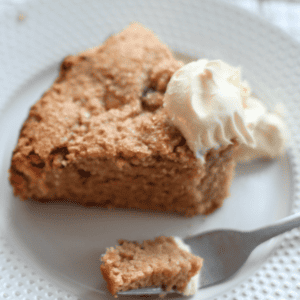
Equipment
- 1 8" Cake Tin lined
Ingredients
- 350 g quince - to give approximately 300g poached fruit, you may need more if the quince are small
- 20 g sultanas
- 1 teaspoon caster sugar - for poaching the fruit
- ⅔ cup olive oil
- 200 g sugar - I used 100g caster sugar and 100g unrefined caster sugar, which has a caramel flavour
- ½ cup plain yogurt - vegan
- 350 g plain flour
- 1 teaspoon cinnamon
- 1½ teaspoon baking powder
- ½ teaspoon sea salt
- lemon - zest only
- 100 g ground almonds
- demerara sugar
Instructions
- Line and grease an 8” cake tin with a loose bottom.
- Preheat the oven to 180c.
- Prepare quince as above.
- Whilst the quince is poaching, beat together the 200g sugar with the olive oil until thoroughly amalgamated.
- Beat in the yogurt, until the mixture has increased in volume and is the texture of mayonnaise.
- Sieve the flour, baking powder, sea salt and cinnamon and fold gradually into the oil and sugar mixture, using a metal spoon. At this point, the mixture will be very stiff.
- Stir in the quince and sultanas, then the ground almonds and lemon zest.
- Again, the mixture will be stiff and have to be spooned into the cake tin.
- Sprinkle with some Demerara Sugar and bake for about an hour but check after 45 minutes.
- A skewer should come out clean.
- Leave to cool and serve in slices with some softly whipped vegan cream.
Please note that where the recipe asks for milk, butter or yogurt, this refers to any plant-based version that you prefer.

